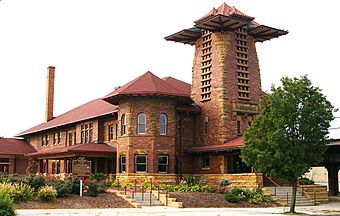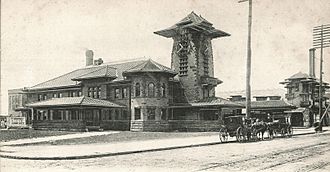Toledo and Ohio Central Railroad Station facts for kids
Quick facts for kids |
|
|
Toledo and Ohio Central Railroad Station
|
|

The station building in 2009
|
|
| Location | 379 West Broad St., Columbus, Ohio |
|---|---|
| Built | 1895 |
| NRHP reference No. | 73001440 |
| Added to NRHP | June 18, 1973 |
The Toledo and Ohio Central Railroad Station is an old train station located in Franklinton, a neighborhood near downtown Columbus, Ohio. It is well-known for its "whimsical and unusual" design, which means it looks fun and unique! Built in 1895 by the Toledo and Ohio Central Railroad, it was a busy place for passengers until 1930. After that, it was used as an office building for Volunteers of America from 1931 to 2003. Since 2007, it has been a meeting hall for a firefighters' union. This special building was added to the National Register of Historic Places in 1973, recognizing its importance.
A Unique Building's Story
The Toledo and Ohio Central Railroad built this station in 1895. They wanted it to show off the amazing skills of architects Joseph Warren Yost and Frank L. Packard. It also showed how successful the railroad was! Back then, the train tracks were on the ground right next to the building.
Designing a Special Station
Across the tracks was a distinctive building called the Macklin Hotel. It had three unique pagoda-style towers. Yost and Packard used the hotel as their inspiration for the station's design. They added an Art Nouveau style, which is a fancy way of saying they gave it a new, flowing, and artistic look.
Changes and Challenges
In 1911, the railroad made a big change. They raised their tracks above the ground. This was done to get rid of "grade crossings." A grade crossing is where train tracks cross roads at the same level, which can be dangerous.
Because of this change, the station had to be modified in an awkward way. Passengers now had to exit the second story of the building to reach the elevated train platform. In 1930, train services moved to the much larger Union Station. This left the Toledo and Ohio Central Railroad Station empty.
A New Purpose
The very next year, in 1931, an organization called Volunteers of America bought the building. They started using it as office space. In 1955, the Macklin Hotel, which had inspired the station's design, was torn down. This meant the station stood alone without its original neighbor.
In 1973, the station was added to the National Register of Historic Places. This made it an officially recognized historic building. Two years later, in 1975, the station suffered a fire that destroyed its roof. But the Volunteers of America worked hard and restored it three years later. The organization eventually moved out of the building in 2003.
In 2007, a group called the International Association of Fire Fighters local 67 bought the station. They restored it again to use as their offices and meeting hall. Today, Norfolk Southern Railroad freight trains still use the elevated tracks next to the building.
 | Claudette Colvin |
 | Myrlie Evers-Williams |
 | Alberta Odell Jones |


